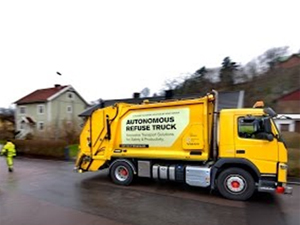



Date:19/05/17
 Volvo Group, together with Swedish waste and recycling firm Renova, is testing an autonomous refuse truck that the companies say has the potential to be used in urban settings. The project explores how automation can contribute to enhanced traffic safety, improved working conditions and lower environmental impact.
Volvo Group, together with Swedish waste and recycling firm Renova, is testing an autonomous refuse truck that the companies say has the potential to be used in urban settings. The project explores how automation can contribute to enhanced traffic safety, improved working conditions and lower environmental impact.
“There is amazing potential to transform the swift pace of technical developments in automation into practical benefits for customers and, more broadly, society in general,” Volvo Group Chief Technology Officer Lars Stenqvist said in a statement. “Our self-driving refuse truck is leading the way in this field globally, and one of several exciting autonomous innovations we are working with right now.”
Volvo Group’s autonomous refuse truck is designed to make the driving safer in built-up areas, not least when reversing. Sensors continuously monitor the vehicle’s vicinity and the truck stops immediately if an obstacle suddenly appears in its path. The route is pre-programmed and the truck drives itself from one wheelie-bin to the next. The driver, who walks ahead of the reversing vehicle, can focus on refuse collection and does not have to climb into and out of the cab every time the truck moves to a new bin.
“One important benefit of the new technology is a reduction in the risk of occupational injuries, such as wear in knee joints—otherwise a common ailment among staff working with refuse collection,” Stenqvist said.
The groups say the autonomous truck also offers environmental upsides. Gearchanging, steering and speed are constantly optimized for low fuel consumption and emissions.
The joint project with Renova will continue until the end of 2017. The autonomous truck currently being tested is fitted with a sensor system for identification, navigation, and monitoring of the vehicle’s vicinity. Most of this technology is also used in the autonomous truck for mining operations that Volvo Group unveiled in 2016. That self-driving truck is undergoing tests in the Kristineberg Mine in northern Sweden.
Volvo Testing Self-Driving Garbage Truck
 Volvo Group, together with Swedish waste and recycling firm Renova, is testing an autonomous refuse truck that the companies say has the potential to be used in urban settings. The project explores how automation can contribute to enhanced traffic safety, improved working conditions and lower environmental impact.
Volvo Group, together with Swedish waste and recycling firm Renova, is testing an autonomous refuse truck that the companies say has the potential to be used in urban settings. The project explores how automation can contribute to enhanced traffic safety, improved working conditions and lower environmental impact.“There is amazing potential to transform the swift pace of technical developments in automation into practical benefits for customers and, more broadly, society in general,” Volvo Group Chief Technology Officer Lars Stenqvist said in a statement. “Our self-driving refuse truck is leading the way in this field globally, and one of several exciting autonomous innovations we are working with right now.”
Volvo Group’s autonomous refuse truck is designed to make the driving safer in built-up areas, not least when reversing. Sensors continuously monitor the vehicle’s vicinity and the truck stops immediately if an obstacle suddenly appears in its path. The route is pre-programmed and the truck drives itself from one wheelie-bin to the next. The driver, who walks ahead of the reversing vehicle, can focus on refuse collection and does not have to climb into and out of the cab every time the truck moves to a new bin.
“One important benefit of the new technology is a reduction in the risk of occupational injuries, such as wear in knee joints—otherwise a common ailment among staff working with refuse collection,” Stenqvist said.
The groups say the autonomous truck also offers environmental upsides. Gearchanging, steering and speed are constantly optimized for low fuel consumption and emissions.
The joint project with Renova will continue until the end of 2017. The autonomous truck currently being tested is fitted with a sensor system for identification, navigation, and monitoring of the vehicle’s vicinity. Most of this technology is also used in the autonomous truck for mining operations that Volvo Group unveiled in 2016. That self-driving truck is undergoing tests in the Kristineberg Mine in northern Sweden.
Views: 337
©ictnews.az. All rights reserved.Similar news
- Justin Timberlake takes stake in Facebook rival MySpace
- Wills and Kate to promote UK tech sector at Hollywood debate
- 35% of American Adults Own a Smartphone
- How does Azerbaijan use plastic cards?
- Imperial College London given £5.9m grant to research smart cities
- Search and Email Still the Most Popular Online Activities
- Nokia to ship Windows Phone in time for holiday sales
- Internet 'may be changing brains'
- Would-be iPhone buyers still face weeks-long waits
- Under pressure, China company scraps Steve Jobs doll
- Jobs was told anti-poaching idea "likely illegal"
- Angelic "Steve Jobs" loves Android in Taiwan TV ad
- Kinect for Windows gesture sensor launched by Microsoft
- Kindle-wielding Amazon dips toes into physical world
- Video game sales fall ahead of PlayStation Vita launch





















